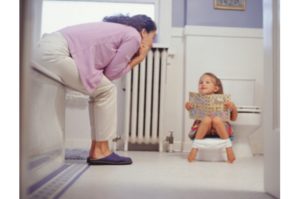 Before starting toilet training, look for signs your toddler is ready. Beginning too soon can be frustrating for both of you and can make the whole process take longer. If you’ve started the process, and potty training was going well for awhile, but all of sudden he is refusing to let himself have a BM or he holds it clinching and fighting for all he is worth to not have a BM, you need some advice.
Before starting toilet training, look for signs your toddler is ready. Beginning too soon can be frustrating for both of you and can make the whole process take longer. If you’ve started the process, and potty training was going well for awhile, but all of sudden he is refusing to let himself have a BM or he holds it clinching and fighting for all he is worth to not have a BM, you need some advice.
Common Issue
Going poop in the potty is a common issue for toddlers…. something about pooping into that bowl really bothers some kids. So they end up holding it in and get constipated. Then it hurts to go because they are constipated, and they are even more afraid to go next time… so they hold it in. A child who poops logs or pellets is constipated, and toilet training a constipated child is a doomed endeavor. Before you even consider training, make sure your child’s poop is totally unformed, like a thick milkshake or hummus. Virtually all children who have trouble training — who hide to poop or seem fearful of the toilet — are clogged up and experience pain with pooping. Then they get more constipated… and so on. It’s a painful cycle for your toddler and can cause potty training to be unsuccessful.
Suggestions
Talk to your pediatrician to form a plan. Some pediatricians suggest using some Miralax for a couple of months. Miralax is a very safe over the counter stool softener that would be fine for toddlers but not for infants. While using Miralax, parents would stop pushing potty training temporarily so the child would forget that pooping ever hurt.
Wait a Few Months and Try Again
The colon needs to get used to normal-sized, soft stools for several months. When constipation occurs, the colon gets stretched out of shape and takes time to get back to normal. The stretch of the colon sends a signal to our brain to tell us that we need to go. If your colon is stretched out already, it takes even more stool to send that signal to your brain. So, it’s important to give your child’s colon time to shrink back to normal size before you stop the Miralax.
Nutrition
It is very important to change your child’s diet. Avoid constipating foods such as bananas, rice, applesauce, white toast, and cheese. Give more fiber like oatmeal, bran, fresh fruits, vegetables, prune juice prunes, and water. For some children, too much milk or dairy can be constipating. Toddlers need around 16-20 oz of milk to get enough calcium, but more than that can result in constipation and anemia (too much calcium can interfere with iron absorption which then leads to anemia or low red blood cells.)
Time to Try Again
Then in about two months, start trying to potty train again. Don’t remind him that he used to do it… just start from scratch… stickers, rewards, etc. Don’t worry – there are very few kindergartners still wearing diapers to poop or pee… so everyone gets it eventually! Refusing to poop in the potty is very common and very normal toddler behavior. For toilet-trained children, as well as for those still being trained, regression in bathroom use usually does not last long. If this happens, respond calmly and use it as an opportunity to support and communicate with your child.
When to Call Your Physician
If your child hasn’t pooped in five days, has vomiting, has blood with stools, or severe stomach pain, call your doctor for help. If your baby is constipated, consult your child’s doctor.
Contact Us (859-525-8181) if you have any questions!
—
 About Pediatrics of Florence
About Pediatrics of Florence
We believe that children are more than just “little adults.” They have unique personalities, challenges, and life circumstances and we have made every effort to make our offices and care as “kid friendly” as possible. We have an aquatic theme in the waiting rooms (separated for sick and well children) as well as themed examination rooms. All of our physicians are Board Certified Pediatricians and members of the American Academy of Pediatrics and our nurse practitioners are all licensed Pediatric Nurse Practitioners and are available to see both well and sick children.
>> Learn More About Pediatrics of Florence
